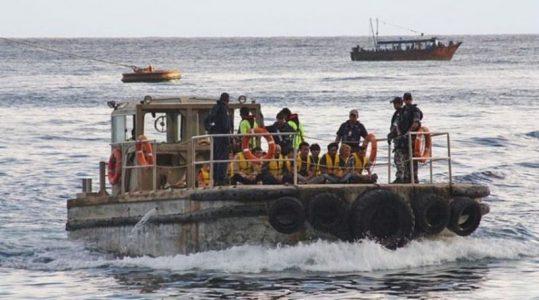
How an ISIS terrorist was able to live in Australia for a year because of a disastrous ASIO bungle
An alleged ISIS extremist could be released on to Australian streets after a simple procedural bungle by Australian security services.
The Iraqi refugee, codenamed BSX15, arrived on Christmas Island six years ago on October 31, 2012, and was let loose on a bridging visa for almost a year.
No one noticed because the name he used on his immigration paperwork was just two letters different – an extra ‘i’ and ‘n’ – to that of a man ASIO identified as an ISIS member.
Finally, he was hauled in for questioning in October 2013 and three months later thrown in to immigration detention where he has remained ever since.
However, he is successfully fighting deportation through the Federal Court, winning the right to appeal in 2017 – and had his costs paid for by the taxpayer.
He argued his adverse security assessment, which prevents his protection visa from being granted, should be quashed on a technicality.
BSX15 prevailed because in 11 hours of interviews over three sessions until January 2012, ASIO agents never actually asked him if he was who they thought he was.
The alleged extremist claimed at his arrival by boat that he was Shia Muslim of Kurdish descent from Mandali on the Iraq-Iran border.
Shia Muslims, a minority in Iraq, were persecuted under then-dictator Saddam Hussein’s regime and he said he ran for his life.
Among the issues ASIO agents raised was his November 2013 wedding shortly before his detention, which was officiated by a Sunni imam.
BSX15 claimed the imam was recommended by a friend, and as he was Shia by descent but non-practicing, it didn’t matter who he chose.
‘He said that he did not go to the mosque, that he drank alcohol, that he did not participate in Shiite festivals,’ the Federal Court judgement read.
‘That he did not fast during Ramadan and that he was generally not religious… and that he does not know how to pray.’
Agents did not buy this explanation and concluded his ‘claim to adhere to Shia Islam’ was false and likely made to hide his ‘connections to Sunni Islamic extremism’.
‘ASIO assesses [BSX15] has made deliberate efforts to hide, minimise and obfuscate his terrorist connections in the course of his security assessment,’ their report said.
‘[He] has been deliberately untruthful with regard to important information about his background, activities, associations and ideology which may be prejudicial to his security assessment.’
Federal Court judges noted ASIO clearly formed its assessment of BSX15 from sources other than his interviews, but much of it was classified and he didn’t have the chance to refute it.
Crucially, a redacted assessment provided to the court listed nine names BSX15 was known by, ranging from two to five words, but not that of the alleged ISIS member.
He was only ever asked ‘do you do by any other names’, to which he simply repeated the name he used in his immigration paperwork.
The judges ruled that the issue was not even whether BSX15 went by the alleged ISIS member’s name, but that he was actually the same person.
If he was not the extremist ASIO thought him to be, then he ‘had no knowledge of any issue arising concerning that name, and could not possibly have been in a position to answer it, or even be aware of the issue’.
‘As a matter of procedural fairness, he did not have an opportunity to answer the question, and could not by reference to the general question, be considered to have sufficiently been put on notice of the issue of concern.’
The judges ordered the security assessment be quashed and BSX15’s appeal be allowed at a later date. Another hearing date has not yet been set.
BSX15 applied for a protection visa in 2015 as a counter to his detention and if successful could force this to be granted after his release.
Home Affairs Minister Peter Dutton’s office said he did not comment on specific cases.
Source: Daily Mail





